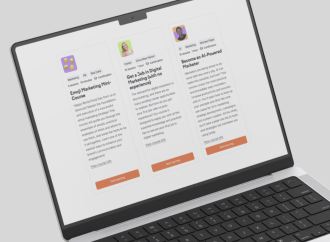The world of AI is growing quickly, and it’s not enough to rely on just one tool. You need AI solutions that suit your specific needs—whether you’re a writer, designer, project manager, or entrepreneur. Instead of searching through endless options, we’ve compiled a list of top AI tools in categories like chatbots, search engines, image

The world of AI is growing quickly, and it’s not enough to rely on just one tool. You need AI solutions that suit your specific needs—whether you’re a writer, designer, project manager, or entrepreneur. Instead of searching through endless options, we’ve compiled a list of top AI tools in categories like chatbots, search engines, image generators, and more. Understanding what each tool does best can help you find the perfect match to enhance productivity, creativity, and customer engagement. Below, we’ll highlight the leading AI tools for 2025, giving you an idea of how they work and why they might become essential in your daily tasks. Read on to find the ideal AI tools for you and see how they can fit seamlessly into your workflow.
AI Assistants (Chatbots)
- ChatGPT: OpenAI’s ChatGPT remains a top choice for conversational tasks, offering detailed responses, brainstorming support, and natural language generation. Trained on vast online data, it handles a wide variety of topics, from software debugging to creative story prompts.
- Gemini: Google’s upcoming competitor in the AI space, Gemini, stands out for its advanced conversational abilities. Integrated with Google services, it aims to provide real-time information, bridging the gap between a chatbot’s knowledge and the latest updates.
- DeepSeek: DeepSeek focuses on technical and scientific queries, using specialized data sets to offer in-depth reasoning. It’s ideal for users in academia or research and development who need precise citations and references.
AI Research Tools
- Deep Research: This tool, powered by ChatGPT, focuses on scholarly articles and technical documentation, making it perfect for knowledge-heavy fields. Instead of scanning broad internet sources, it pulls from scientific databases to provide curated reading lists or summaries for quick insights. Professionals use it for verifying stats or gathering references, and its algorithms can connect seemingly unrelated papers to spark new ideas or confirm existing hypotheses.
AI Search Engines
- Perplexity: Perplexity goes beyond traditional search engines by analyzing context and delivering concise, answer-focused results. It’s a time-saver for anyone frustrated by endless, irrelevant links, and its summarization features make research much more efficient.
- ChatGPT Search: Combining conversational AI with search capabilities, ChatGPT Search lets you query topics in a dialogue format. This tool is praised for its ability to refine questions and offer deeper explanations, rather than just listing URLs, making it easy to explore topics within the chat window.
AI Writing Tools
- Rytr: Rytr’s simple interface and variety of tone settings make it one of the best AI tools for drafting blog posts, emails, and social media content. With templates for different writing tasks, it helps you write faster without sacrificing quality or coherence.
- Sudowrite: Sudowrite is perfect for creative writing, whether you’re polishing a novel draft or generating story outlines. Its advanced language model suggests plot twists or character development ideas, helping writers maintain their voice and style.
AI Grammar Checkers
- Grammarly: Known for its grammar, spelling, and style corrections, Grammarly works across multiple platforms to keep your writing polished and professional. It helps with everything from tone to clarity and offers real-time suggestions for improvement.
- Wordtune: Wordtune takes a unique approach by suggesting ways to rephrase sentences for better fluency or more varied expression, all while preserving the original meaning. It’s great for refining your writing, whether for essays or marketing copy.
AI Image Generators
- Mid Journey: Mid Journey excels at generating artistic images from text prompts, creating surreal, painterly visuals that are perfect for designers. Simply describe your vision—like a “sunset forest in watercolor”—and watch it come to life in stunning digital art.
- DALL·E 3: DALL·E 3 is perfect for generating crisp, coherent visuals that align with specific brand guidelines. It creates refined results for product mockups and ads while also having the ability to create whimsical imagery, making it versatile for various design tasks.
AI Scheduling Assistants
- Reclaim: Reclaim automatically schedules time for routine tasks, helping to create a well-structured calendar. It adapts based on your habits, minimizing conflicts and ensuring you have focused time, helping you meet deadlines without micromanaging your day.
- Clockwise: Clockwise optimizes meeting schedules by scanning availability and minimizing disruptions. It’s especially useful for teams across different time zones, reducing the back-and-forth of emails and quickly confirming meeting times that work for everyone.
AI Design Tools
- Looka: Looka is an AI tool for generating logos and branding elements. By entering your preferences for colors and styles, it creates multiple logo options that you can tweak, making it an excellent tool for startups on a budget.
- Canva Magic Studio: Canva Magic Studio builds on Canva’s user-friendly interface, adding AI that suggests layouts, color schemes, and background designs tailored to your content. It’s ideal for creating quick social media graphics and promotional materials.
AI Voice Generators
- ElevenLabs: ElevenLabs is renowned for creating realistic, human-like speech. It’s great for podcasts, video narration, or customer support calls and can replicate voice styles or create new ones. It’s especially useful for creating accessible content or e-learning modules.
- Murf: Murf is known for adding emotional depth and variety to synthesized voices. If you need a voiceover that conveys excitement, warmth, or professionalism, Murf provides a wide range of tonalities that work well for commercial voiceovers or promotional videos.
AI Project Management Tools
- Asana: Asana’s AI features assign tasks, predict completion times, and identify potential bottlenecks. It’s one of the best tools for organizing team workflows and is particularly helpful for scaling teams looking for data-informed project tracking.
- ClickUp: ClickUp uses machine learning to analyze task patterns and optimize processes. It suggests adjustments to task durations and groups similar tasks together, helping manage complex projects with multiple dependencies.
AI for Recruitment
- Textio: Textio enhances job listings by refining the language to appeal to a broader range of qualified candidates. It spots biased or exclusionary terms, helping companies create more inclusive job ads that reach a wider applicant pool.
- CVViZ: CVViZ uses AI to quickly parse resumes and match them to job requirements, offering a more comprehensive analysis of skills, experiences, and achievements. This helps recruiters save time by efficiently evaluating large volumes of resumes.
AI Knowledge Management Tools
- Notion AI Q&A: Notion AI Q&A is a tool that searches your organization’s Notion workspace for relevant information and presents answers in simple, understandable language. It centralizes knowledge to keep your team aligned and informed.
AI Email Assistants
- Shortwave: Shortwave helps you manage your inbox by prioritizing important emails and automating replies. By analyzing response patterns, it suggests replies that fit your usual tone, maintaining consistency while saving time.
Unleash Your Potential with AI
Finding the right AI tools for your needs can be overwhelming, but each category—from chatbots to project management—offers a unique way to improve your workflow, enhance creativity, and reduce busywork. As you explore your options, remember that the best AI tools are the ones that align with your goals. For writers, a suite of writing and grammar tools may be ideal, while an e-commerce business might need image generators, scheduling assistants, or knowledge management tools to streamline their operations.
A single business may use multiple platforms across different categories. For example, a marketing firm might rely on ChatGPT for brainstorming, Mid Journey for creating graphics, Asana for managing projects, and Shortwave for handling emails. Combining these tools can lead to improved efficiency and creativity. Whether you’re looking to simplify your daily tasks, create stunning visuals, or enhance your online presence, exploring the best AI tools is key to staying ahead in 2025 and beyond.

















Leave a Comment
Your email address will not be published. Required fields are marked with *